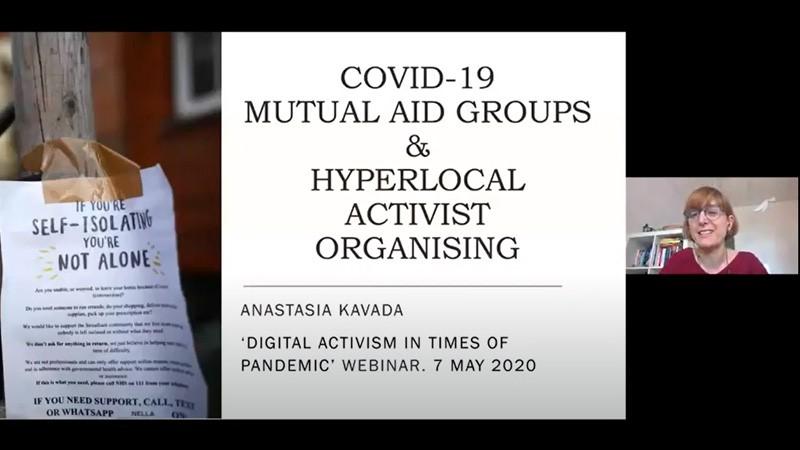Anastasia Kavada, Reader and Course Leader of the Media, Campaigning and Social Change MA course, gave a talk at the Digital Activism in Times of Pandemic webinar.

Kavada joined an expert panel on digital activism to discuss what forms activism might take during a pandemic. She gave a talk on ‘COVID-19 Mutual Aid Groups & Hyperlocal Activist Organising’. This involved looking at coordination of such groups in the UK and how they compare with the NHS first responder volunteer service.
The webinar brought together activists and social movement scholars from around the world to discuss these new forms of online activism and asked how activists are using the internet and social media to mobilise against injustices revealed by the pandemic. They also asked how activists are using online organising tools to cope with the isolation produced by lockdown measures.
The panel was organised by the International Sociological Association Research Committee on Social Classes & Social Movements, and the Centre for Digital Culture at Kings College London.
Those also speaking were Paolo Gerbaudo, Senior Lecturer in Digital Culture and Society from King’s College London, Mengying Li, former PhD student in the Department of Digital Humanities also from King’s College London, and Marisa von Bulow, Associate Professor at the University of Brasilia.
Kavada is also the Co-Director of the Communication and Media Research Institute (CAMRI) at the University of Westminster. Her research focuses on the links between online tools and decentralised organising practices, democratic decision-making, and the development of solidarity among participants in collective action. Her work has appeared in a variety of edited books and academic journals, including Media, Culture & Society and Information, Communication & Society. Her current work has the provisional title ‘Experiments in Democracy: Digital Communication and Social Movements’.
Kavada said during her talk: “There are currently 3,493 mutual aid groups across the United Kingdom. These groups are formed by neighbours who are helping those who are self-isolating either because they’re sick or they’re in the vulnerable category. Basically what they do is running errands for people who cannot leave home.
They’re picking up shopping or prescriptions, they make friendly phone calls, they may be posting mail or paying bills in the post office for people or walking their dogs.
“So why focus on these groups? One of the reasons was when Paolo asked me if I had something to present here I thought ‘I’m one of the organisers of these groups’ and I thought I could combine my personal observations with some desk research in order to talk about this interesting phenomenon. The more academic justification is that I think groups like this are often overlooked in research on digital activism. The emphasis is much more on protests and public solidarity and much less on organising and capacity building.”

